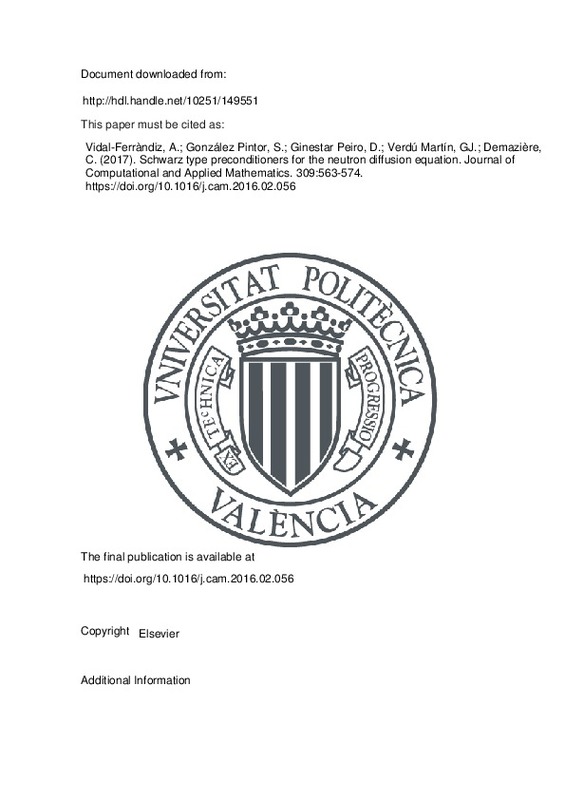JavaScript is disabled for your browser. Some features of this site may not work without it.
Buscar en RiuNet
Listar
Mi cuenta
Estadísticas
Ayuda RiuNet
Admin. UPV
Schwarz type preconditioners for the neutron diffusion equation
Mostrar el registro sencillo del ítem
Ficheros en el ítem
| dc.contributor.author | Vidal-Ferràndiz, Antoni
|
es_ES |
| dc.contributor.author | González Pintor, Sebastián
|
es_ES |
| dc.contributor.author | Ginestar Peiro, Damián
|
es_ES |
| dc.contributor.author | Verdú Martín, Gumersindo Jesús
|
es_ES |
| dc.contributor.author | Demazière, Christophe
|
es_ES |
| dc.date.accessioned | 2020-09-08T03:32:21Z | |
| dc.date.available | 2020-09-08T03:32:21Z | |
| dc.date.issued | 2017-01-01 | es_ES |
| dc.identifier.issn | 0377-0427 | es_ES |
| dc.identifier.uri | http://hdl.handle.net/10251/149551 | |
| dc.description.abstract | [EN] Domain decomposition is a mature methodology that has been used to accelerate the convergence of partial differential equations. Even if it was devised as a solver by itself, it is usually employed together with Krylov iterative methods improving its rate of convergence, and providing scalability with respect to the size of the problem. In this work, a high order finite element discretization of the neutron diffusion equation is considered. In this problem the preconditioning of large and sparse linear systems arising from a source driven formulation becomes necessary due to the complexity of the problem. On the other hand, preconditioners based on an incomplete factorization are very expensive from the point of view of memory requirements. The acceleration of the neutron diffusion equation is thus studied here by using alternative preconditioners based on domain decomposition techniques inside Schur complement methodology. The study considers substructuring preconditioners, which do not involve overlapping, and additive Schwarz preconditioners, where some overlapping between the subdomains is taken into account. The performance of the different approaches is studied numerically using two-dimensional and three-dimensional problems. It is shown that some of the proposed methodologies outperform incomplete LU factorization for preconditioning as long as the linear system to be solved is large enough, as it occurs for three-dimensional problems. They also outperform classical diagonal Jacobi preconditioners, as long as the number of systems to be solved is large enough in such a way that the overhead of building the pre-conditioner is less than the improvement in the convergence rate. (C) 2016 Elsevier B.V. All rights reserved. | es_ES |
| dc.description.sponsorship | The work has been partially supported by the spanish Ministerio de Economía y Competitividad under projects ENE 2014-59442-P and MTM2014-58159-P, the Generalitat Valenciana under the project PROMETEO II/2014/008 and the Universitat Politècnica de València under the project FPI-2013. The work has also been supported partially by the Swedish Research Council (VR-Vetenskapsrådet) within a framework grant called DREAM4SAFER, research contract C0467701. | es_ES |
| dc.language | Inglés | es_ES |
| dc.publisher | Elsevier | es_ES |
| dc.relation.ispartof | Journal of Computational and Applied Mathematics | es_ES |
| dc.rights | Reconocimiento - No comercial - Sin obra derivada (by-nc-nd) | es_ES |
| dc.subject | Neutron diffusion | es_ES |
| dc.subject | Finite element method | es_ES |
| dc.subject | Substructuring | es_ES |
| dc.subject | Schwarz preconditioner | es_ES |
| dc.subject.classification | MATEMATICA APLICADA | es_ES |
| dc.subject.classification | ESTADISTICA E INVESTIGACION OPERATIVA | es_ES |
| dc.subject.classification | INGENIERIA NUCLEAR | es_ES |
| dc.title | Schwarz type preconditioners for the neutron diffusion equation | es_ES |
| dc.type | Artículo | es_ES |
| dc.type | Comunicación en congreso | es_ES |
| dc.identifier.doi | 10.1016/j.cam.2016.02.056 | es_ES |
| dc.relation.projectID | info:eu-repo/grantAgreement/MINECO//ENE2014-59442-P/ES/DESARROLLO DE NUEVOS MODELOS Y CAPACIDADES EN EL SISTEMA DE CODIGOS ACOPLADO VALKIN%2FTH-3D. VERIFICACION, VALIDACION Y CUANTIFICACION DE INCERTIDUMBRES/ | es_ES |
| dc.relation.projectID | info:eu-repo/grantAgreement/UPV//FPI-2013 | es_ES |
| dc.relation.projectID | info:eu-repo/grantAgreement/MINECO//MTM2014-58159-P/ES/PRECONDICIONADORES PARA SISTEMAS DE ECUACIONES LINEALES, PROBLEMAS DE MINIMOS CUADRADOS, CALCULO DE VALORES PROPIOS Y APLICACIONES TECNOLOGICAS/ | es_ES |
| dc.relation.projectID | info:eu-repo/grantAgreement/Swedish Research Council Formas//C0467701/ | es_ES |
| dc.relation.projectID | info:eu-repo/grantAgreement/GVA//PROMETEOII%2F2014%2F008/ES/New improved capacities in 3d-VALKIN (Valencian Neutronic Kinetisc). N3D-VALKIN/ | es_ES |
| dc.rights.accessRights | Abierto | es_ES |
| dc.contributor.affiliation | Universitat Politècnica de València. Departamento de Matemática Aplicada - Departament de Matemàtica Aplicada | es_ES |
| dc.contributor.affiliation | Universitat Politècnica de València. Departamento de Ingeniería Química y Nuclear - Departament d'Enginyeria Química i Nuclear | es_ES |
| dc.description.bibliographicCitation | Vidal-Ferràndiz, A.; González Pintor, S.; Ginestar Peiro, D.; Verdú Martín, GJ.; Demazière, C. (2017). Schwarz type preconditioners for the neutron diffusion equation. Journal of Computational and Applied Mathematics. 309:563-574. https://doi.org/10.1016/j.cam.2016.02.056 | es_ES |
| dc.description.accrualMethod | S | es_ES |
| dc.relation.conferencename | Mathematical Modelling in Engineering & Human Behaviour 2015. 17th Edition of the Mathematical Modelling Conference Series at the Institute for Multidisciplinary Mathematics | es_ES |
| dc.relation.conferencedate | Septiembre 09-11,2015 | es_ES |
| dc.relation.conferenceplace | Valencia, Spain | es_ES |
| dc.relation.publisherversion | https://doi.org/10.1016/j.cam.2016.02.056 | es_ES |
| dc.description.upvformatpinicio | 563 | es_ES |
| dc.description.upvformatpfin | 574 | es_ES |
| dc.type.version | info:eu-repo/semantics/publishedVersion | es_ES |
| dc.description.volume | 309 | es_ES |
| dc.relation.pasarela | S\331827 | es_ES |
| dc.contributor.funder | Swedish Research Council Formas | es_ES |
| dc.contributor.funder | Universitat Politècnica de València | es_ES |
| dc.contributor.funder | Ministerio de Economía y Competitividad | es_ES |
| dc.contributor.funder | Generalitat Valenciana | es_ES |







![[Cerrado]](/themes/UPV/images/candado.png)

